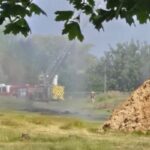In a striking display of how global crises can disrupt even the most important diplomatic gatherings, President Donald Trump abruptly departed the G7 Summit in Alberta today, cutting short his participation in the high-level economic forum as tensions in the Middle East reached critical levels.
“I cannot remain here while American interests are at stake,” Trump told reporters in a hastily arranged press conference at the Fairmont Banff Springs Hotel. The president’s motorcade was seen leaving the summit venue just hours after bilateral meetings with Canadian Prime Minister Justin Trudeau and other world leaders.
Sources within the White House delegation confirmed that Trump received an urgent security briefing at 4:30 AM local time, prompting the decision to return to Washington. National Security Advisor Robert O’Brien will remain at the summit to represent U.S. interests in the president’s absence.
The precise nature of the Middle East crisis remains deliberately vague in official statements, though diplomatic sources point to escalating tensions between Israel and Iran following a series of maritime incidents in the Strait of Hormuz. The U.S. State Department issued a travel advisory for American citizens in the region just moments before Trump’s announcement.
“We’re dealing with extremely volatile conditions,” said a European diplomat attending the summit who requested anonymity due to the sensitivity of the situation. “Several leaders received similar intelligence briefings this morning, but Trump is the only one departing.”
This marks the third time in recent years that Trump has left an international summit before its conclusion. In 2019, he departed the NATO leaders’ meeting in London early following tense exchanges with Canadian and European counterparts.
The Alberta summit, focused primarily on climate change, digital regulation, and post-pandemic economic recovery, will continue without the American president. A joint communiqué is still expected, though negotiators are scrambling to adjust language regarding Middle East stability.
“The president’s departure complicates our consensus-building, particularly on statements related to regional security,” admitted one G7 official involved in drafting the final document.
Markets reacted swiftly to the news, with oil prices jumping 3.7% in early trading and gold reaching a six-month high as investors sought safe havens amid the uncertainty.
On the streets of Banff, where thousands of protesters had gathered to voice concerns about climate policy, reactions to Trump’s departure were mixed. “He wasn’t contributing meaningfully anyway,” said climate activist Serena Mathews, 26. “But the reason for his departure is deeply concerning.”
The Canadian government, meanwhile, has increased security around the summit perimeter, with RCMP officers in tactical gear visible at checkpoints and along the routes to Calgary International Airport.
“We respect President Trump’s decision and understand the gravity of the situation,” Prime Minister Trudeau told the remaining leaders during the morning session. “Canada stands ready to assist in diplomatic efforts to reduce tensions in the Middle East.”
As Air Force One prepared for departure, the contrast between the pristine Rocky Mountain backdrop and the urgent geopolitical reality couldn’t have been starker. What was meant to be a showcase of global economic cooperation has instead highlighted how quickly international crises can upend the best-laid diplomatic plans.
For the remaining G7 leaders, the summit continues, albeit under a cloud of uncertainty about what developments in the Middle East might mean for global stability in the coming days. German Chancellor Olaf Scholz has reportedly scheduled an emergency meeting with French President Emmanuel Macron to discuss European responses to the situation.
“The irony isn’t lost on anyone,” said James Bennington, a regional security analyst with the International Crisis Group. “A summit meant to address long-term challenges is being overtaken by immediate crises—exactly the pattern that has prevented meaningful progress on climate and economic inequality for decades.”
As the president’s blue and white Boeing 747 lifted off from Calgary, the question hanging in the air wasn’t just about what awaits in the Middle East, but whether the G7’s relevance as a forum for global governance is diminishing in a world of perpetual crisis.






